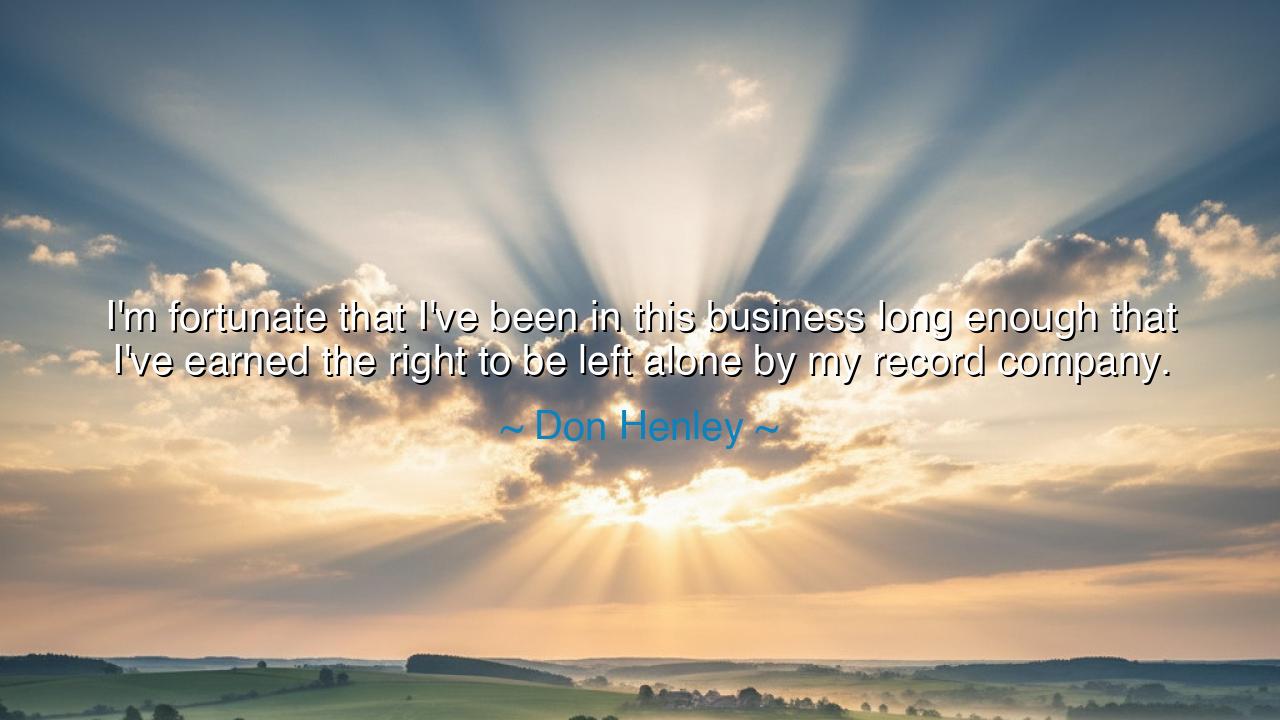
I'm fortunate that I've been in this business long enough that
I'm fortunate that I've been in this business long enough that I've earned the right to be left alone by my record company.






“I’m fortunate that I’ve been in this business long enough that I’ve earned the right to be left alone by my record company.” — Thus spoke Don Henley, the voice of generations and co-founder of The Eagles, a man who soared through the heavens of fame and weathered the tempests of the music industry. These words are not merely a statement of privilege; they are a reflection upon freedom, independence, and the price that must be paid to attain them. For in every art — as in every life — there comes a time when mastery is not granted, but earned through endurance, labor, and the long passage of years.
The origin of this quote lies in the hard-earned wisdom of experience. Don Henley, who began his journey as a young musician in the turbulent age of rock and rebellion, spent decades navigating the pressures of commercial expectation and creative control. The record company, that towering structure of commerce and authority, often seeks to guide — or to bind — the artist, measuring music not by truth but by profit. Yet Henley, through time, success, and uncompromising integrity, reached a place where he could stand unshaken, where his art was governed not by executives but by his own conscience. To be “left alone” is, in his words, not a retreat from the world, but the summit of self-determination — a reward won by the steadfast spirit.
This truth, though spoken in the language of music, belongs to all who strive for mastery in their craft. The ancients too revered this path of liberation through discipline. Consider Michelangelo, who in his youth toiled under the patronage of powerful men — popes, princes, and patrons who sought to control his art. Yet by the end of his life, he worked as he willed, answering only to the divine voice that guided his chisel. He had earned the right to be left alone, not through rebellion, but through excellence — through the undeniable weight of his genius. So it is with all creators: when one’s work speaks with enough truth, even power itself must bow in silence.
Henley’s words also speak to the eternal struggle between freedom and control, between art and commerce, between the soul’s voice and the world’s demand. In every era, the creator must wrestle with those who would define, limit, or shape his vision. Yet freedom is not given to the novice — it must be bought with patience, consistency, and the courage to resist compromise. The young artist pleads for permission; the seasoned one no longer needs to ask. For every chord played, every lyric written, every wound suffered in the pursuit of authenticity, becomes a stone in the foundation of that hard-won liberty.
There is, too, in Henley’s tone, a note of gratitude. He does not boast of power; he speaks of fortune. He understands that such freedom, though earned, is fragile — that it is both a blessing and a burden. To be “left alone” is to be trusted, but also to bear full responsibility for one’s choices. There are no excuses, no external forces to blame — only the quiet, sacred dialogue between the artist and his creation. In this solitude lies both peace and weight, for the liberty to create as one pleases is also the demand to create something worthy of that liberty.
In this, his wisdom mirrors that of Marcus Aurelius, the philosopher-emperor, who wrote, “The soul becomes dyed with the color of its thoughts.” To live long enough in one’s calling to be trusted with freedom is to be tested by it. Many crave independence but fear the solitude it brings; many demand creative control but lack the depth to wield it wisely. Henley, like the stoics of old, reminds us that the highest freedom is not rebellion against authority, but the mastery of self — the power to stand alone, to answer to no one but truth itself.
Thus, the lesson is clear: if you seek to be “left alone” — to live, to work, to create on your own terms — then first earn that right through dedication, excellence, and integrity. Freedom without merit is chaos, but freedom earned through mastery is grace. Whatever your field, become so skilled, so disciplined, that your work speaks louder than your defense. Let your reputation become your shield, your craft your sanctuary. And when the day comes that you, too, are trusted to walk alone, remember to walk humbly — for the silence of independence is not an escape from the world, but the echo of a life lived in truth.
For in the end, to be “left alone” is not to be abandoned, but to be recognized — as one who has journeyed through the trials of dependence, the tests of ambition, and the fires of creation, and has emerged sovereign of one’s own soul. That is the gift of experience, the triumph of patience, and the reward of all who persist long enough to turn struggle into sovereignty.






AAdministratorAdministrator
Welcome, honored guests. Please leave a comment, we will respond soon